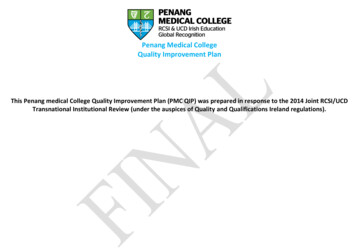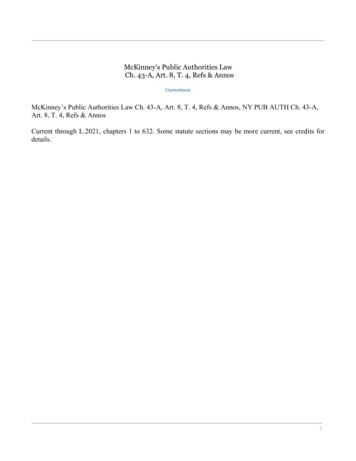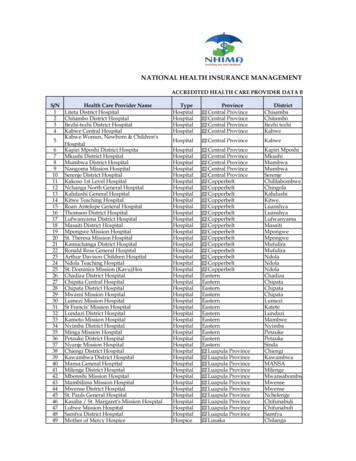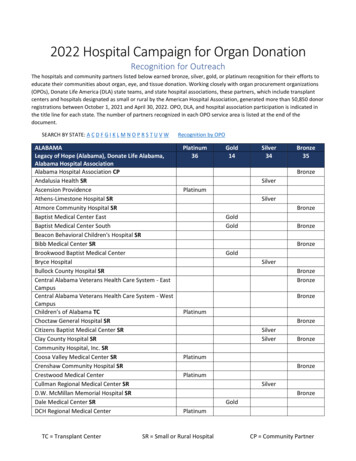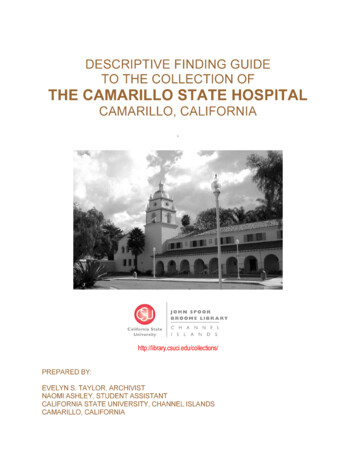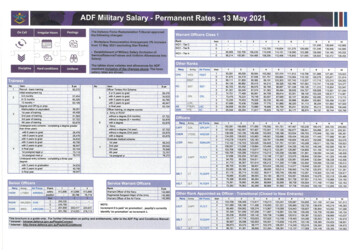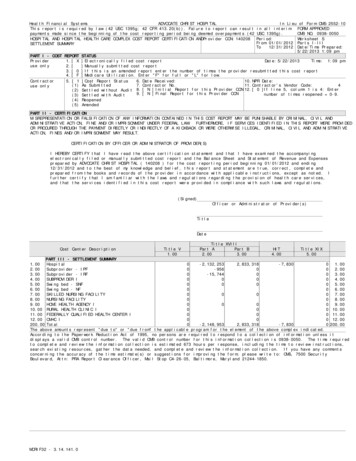
Transcription
RCSI HospitalGroup Quality andPatient SafetyConference 2022Abstracts
CONTENTS1Abstract TitlePageEnhanced Recovery After Surgery (Caesarean Section)3Referrals of abnormal head shapes accompanied by photographs: A quality improvement project at the NationalPaediatric Craniofacial Centre4Using the modified Cannard Falls Risk Assessment tool to change howwe manage falls prevention on a medical ward5Validation of a galactomannan lateral flow assay on-site: a potential tool for developing a diagnostic antifungalstewardship care bundle6Development of the COVID-19 Remote Monitoring programme inOur Lady of Lourdes Hospital, Drogheda7Antibody-Incompatible Matching Program for Kidney Transplant Patients8The Early Provision of Buccal Colostrum as Part of Oral Cares forPreterm Babies in NICU - a multidisciplinary project9Two Heads are Better than One: Stereotactic EEG and Deep Brain Stimulation Surgery WorkflowRefinement using 3D Printed Heads10Improving Spinal Bracing Competency Levels within the MDT in theNorth-East RCSI Hospital Group11Can the introduction of a Physiotherapy Led Clinic in Emergency enhance clinical and patientreported outcomes and offer an alternative safe, expedited pathway of care?12A Pilot interdisciplinary Virtual Prehabilitation programme for patients undergoing elective anterior resection andHartmanns reversal surgery in Our Lady of Lourdes Hospital Drogheda13Cognitive Stimulation Therapy Programme - Planning, Introduction and Evaluation of a Non PharmacologicalIntervention in Cognitive Impairment14Don’t find excuses, find solutions - An Advanced Physiotherapy Practitioners experience ofoptimising timely discharge from Emergency, regardless of age or frailty status15Effect of adopting a Medical Speciality Ward model on Patient Outcomes16Preventing hospital-acquired venous thromboembolism events in Beaumont Hospital17Evolution of the radiosurgical treatment of arteriovenus malformations at St. Luke’s radiationoncology centre and Beaumont Hospital18A comparison of the CFS, THINK Frail, InterRai and PRISMA 7 within the Emergency Department19Introduction of Surface Guided Radiotherapy to St Luke’s Radiation Oncology Network20Development of an interdisciplinary booklet called 'Preparing for your bowel Surgery' providing pre-operativeeducation for patients undergoing elective bowel surgery in Our Lady of Lourdes Hospital Drogheda21A Digital Self-Management/Self-Referral System for Maternity Physiotherapy22Multidisciplinary Trauma Assessment Clinic: An Alternative Pathway of Care for Orthopaedic Outpatients23Postmenopausal Bleeding in Ambulatory Gynaecology24A quality improvement project: The successful implementation of a standardised clinic templatefor screening radiation-induced late-effects in Hodgkin lymphoma (HL) patients.25Introduction of a safety checklist for patients undergoing changes of position under anaesthesia26Pandemic – Seizing the opportunity to improve a patient’s acute musculoskeletal journey in the emergencydepartment27Development of Tracheostomy Care Bundle following Benchmark Audit28The Older Person Assessment and Liaison Team - CGA in the ED at Our Lady of Lourdes Hospital, Drogheda29Introduction of point of care COVID 19 molecular testing in Rotunda hospital for all the unplanned admissions toprevent cross transmission of COVID 19 in the shared accommodation of inpatient facilities in Rotunda MaternityHospital30
Abstract TitlePagePrevention of neonatal falls in the clinical areas31Reflection Rounds "It's Time to Listen"32Introduction of a Labour Ward Huddle – a tooI to improve situational awareness33An Audit of the Ward Based IT Infrastructure of the University Hospital of Limerick34Top up of epidural blockade for emergency caesarean delivery: Rotunda Hospital current practice35“Championing Continence” - Establishment of a Multidisciplinary Continence Promotion Working Group in an AcuteTeaching Hospital362Introduction of a Standardised Screening Tool for Referral to Occupational Therapy and Physiotherapy onSpecialist Geriatric Wards37Assessing effectiveness of an Outreach Visit Pathway direct from ED for patients seen by the FrailtyIntervention Therapy Team (FITT) and requiring further follow up in their own environment38Exploration of Physiotherapists and Occupational Therapists competence and training needs for acutetransfemoral and transtibial amputees in Our Lady of Lourdes Hospital Drogheda39Establishing a Post Acute Covid-19 AHP led rehabilitation clinic40An Audit on patient outcomes post frailty class attendance41Improving physiotherapy documentation in keeping with IHFD requirements in Our Lady of Lourdes HospitalDrogheda42Technology Enhanced Blended Learning for Intravenous Medication Administration Training for Registered Nurses43Pilot pathway for improved identification of aortic dissection (AD) at Tallaght University Hospital (TUH)Emergency Department (ED)44An Audit on Mobility Following Femoral Neck Fracture Surgery: Does Surgical Treatment AffectPhysiotherapy Outcome?45The introduction of a physiotherapy breast care pathway at Our Lady of Lourdes (OLOL) Hospital,Drogheda46Establishment of an Early Supported Discharge Team, for older persons, within County Monaghan47Preparing for the commencement of the Decision Making Capacity Act 201548Impact of a novel "Outreach Pre-operative Assessment" service for Neurosurgery patients atBeaumont Hospital49Get Up Get Dressed Get Moving – Medical 5 gets moving to keep you improving50Open Disclosure Skills Workshop51Inpatient Consultation Service in SLRON Beaumont52Birth Reflections53Improving the Neurological Outcome of Patients in Connolly Hospital54Falls Prevention and Management in Woodlands Unit55Improving communication between hospital staff and patient’s families during Covid-19 in Cavan& Monaghan Hospital56Multidisciplinary Team Approach to Incident ReviewsImproves Patient Care57Digital Signage in Radiotherapy58Impact on routine non contrast spinal MRI requests with improved access to the nationalneurosurgical service59
TITLEEnhanced Recovery After Surgery (Caesarean Section)SUBMITTED BYEimear Lawlor, CMM2 Enhanced Recovery After Surgery,Rotunda HospitalABSTRACTINTRODUCTIONCaesarean sections are the most common surgicalprocedure performed worldwide with rates continuingto rise. Caesarean section (CS) patients face the dualchallenge of being postpartum and post-operative;therefore it is crucial we provide the highest standardsof perioperative care to ensure improved recovery.Enhanced recovery after surgery (ERAS) involves a seriesof evidence based, patient-centred protocols that aims tostandardise the perioperative care of the patient, helpingpatients return to their baseline level of function as soonas possible. ERAS has been shown to address the “tripleaim”; improving quality of care while reducing cost andincreasing patient satisfaction.(1)RESULTSOver 200 patients have gone through the programme todate. Overall, we have seen tremendous improvementsin reaching some of our KPI’s. These include reducedfasting time pre and post-operatively, earlier mobilisationand catheter removal, improved pain scores and reducedlength of stay. There have been no cases of Ileus, and noreadmissions. 60% of patients availed of early dischargehome. 89% of patients were followed up with theCommunity Midwifery TeamMETHODOLOGYImplementation involved a ‘Plan-Do-Study-Act’ approach. A standardised approach to ERAS patients helps staffto improve the quality of care provided at ward level. Earlier discharge reduces hospital costs, and allowspatients to recover in the comfort of their home.AIMDevelop and implement Irelands's first ERAS programmefor Caesarean Sections by September 2021.CHANGE IMPLEMENTED1. Protocols to optimize maternal anaemia, limit fastingtimes pre and post-op, earlier resumption of oral diet,manage pa
A comparison of the CFS, THINK Frail, InterRai and PRISMA 7 within the Emergency Department 19 . Digital Signage in Radiotherapy 58 . Finding solutions via untapped or hidden resources can be a way to offer equity, value and cost to these service users. METHODOLOGY Clinical microsystems - 5 Ps - Purpose, Patients,
